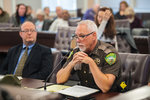











The Board of Lewis County Commissioners’ business meeting Tuesday started with a crowded room and ended with applause.
After a marathon hours-long meeting of questions and comments from the public where many were in support and several others opposed, the commissioners voted 3-0 to approve an ordinance prohibiting unauthorized camping on county land and 3-0 to adopt a resolution for homeless encampment removals and site cleanups.
According to Kevin McDowell, a deputy prosecuting attorney who presented on the actions, the policy requires 72-hour abatement notification for residents of encampments and ensures there will be adequate shelter space in the county before people are made to leave. The only homeless shelter in Lewis County currently is hosted by the Salvation Army in Centralia, which has been criticized by both guests and government officials as not being fit for dwelling. It is a night-by-night shelter, where residents must vacate the building during the daytime. The Salvation Army was only contracted for that work within the last few months after Commissioner Sean Swope noted in meetings that the county needed a shelter in order to legally move unhoused people off public land.
The largest encampment in Lewis County is currently at the end of Eckerson Road in Centralia, commonly referred to as Blakeslee Junction. Because of proximity to Interstate 5, the land is under the jurisdiction of the state Department of Transportation. Tuesday’s policy does not address that area, but Swope assured that the department was working toward clearing that encampment.
In the most recent meeting of the Lewis County mayors, municipalities were encouraged to adopt the ordinance and resolution as well. Many local encampments are currently on city property, over which the county has no authority. It is not clear whether Centralia will adopt the policy. Representatives from Winlock, Chehalis, Mossyrock, Morton and other cities have expressed plans to adopt the same or similar ordinances. Thanks to a 2018 decision by the United States Court of Appeals for the Ninth Circuit called Martin v. Boise, those rules would all be subject to unhoused people having access to adequate shelter space.
The county has plans to build a night-by-night shelter in the current location of its public works department on Kresky Avenue. It is supposed to be up and running within the first half of 2023.
Last year, a lack of housing across the board in Lewis County, according to public health officials, residents and realtors alike, pushed the commissioners to take a special interest in housing through workshops, study and the hiring of a housing and infrastructure specialist. Advocates for people experiencing homelessness were vocally excited about the steps being taken, including staff at Gather Church, which ran the county’s coordinated entry housing program for over a year.
Within the following months, Swope took ire with the local government’s approach to homelessness, multiple times telling the public and county staff that the system is broken and that “accountability” needed to be a more central part of the conversation. In other words, he wanted people to meet certain benchmarks of success, like getting a job, in order to receive services. He received pushback from housing advocates because of these statements.
Many speakers echoed his sentiment on Tuesday morning. The general feeling of those in support, as it was stated by several speakers, was that government should exist to give people “a hand up, not a handout.” By letting people stay at encampments on unincorporated county land, the county would be enabling homelessness, they said.
About 10 people spoke out against the ordinance and policy while about 20 spoke in favor of the county voting to approve the items. Others remained ambiguous on their opinion of the line items but asked questions or made comments on their experience and views related to housing and homelessness.
Mental health providers, pastors and congregants from several churches throughout the county, business owners, well-known politicians, law enforcement officers, volunteer trash cleaners and several others spoke out soulfully. Bible verses were read. Tears were choked back. Fists were clenched.
Many people cited the work of Gather Church as having a negative impact, with some of the harshest of those critics saying the organization was “catering” encampments. Others implied the church was to blame for negative effects of homelessness in Lewis County.
Pastor Cole Meckle and co-pastor Patty Howard from the church were among those opposing the actions, calling into question both the funding mechanisms of the work to sweep encampments and the motive behind the policies.
“Obviously, businesses are impacted, community members are impacted, everybody here is impacted,” Meckle said in his public testimony. “There’s one thing we can do that’s going to help this — and only one thing. We need housing.”
Officials recognized that the funding method was unclear, but Swope said the county would seek grants from the Department of Ecology and said, “The alternative is we do nothing.”
Ultimately the crowd seemed to favor this opinion, with applause coming after speeches from Swope, Sheriff Rob Snaza and Commissioner Lee Grose signaling their support.
After the meeting, Meckle told The Chronicle, “Our attitude is we’ll just keep doing what we can for those that have needs.”
Asked by a reporter to address those in the room who were opposed to the policy, Swope referred to the $22 million of Department of Commerce grants that had been allocated toward homeless and housing services in Lewis County for 2020 to 2023. He said despite the allocations, homelessness in the community has gotten worse. For the first time since discovering that number, Swope said it wasn’t all that much considering the vastness of the issue. But he said the efforts have not been effective in tackling substance abuse issues or problems with mental health.
“The definition of insanity is doing the same thing over and over and expecting different results,” he said.
He said the policy was simply addressing the symptoms of the issue at hand, saying he agreed with those who spoke about the actions being only a small step.
Watch the entirety of Tuesday’s meeting at https://www.youtube.com/watch?v=jxasek-NQMw.